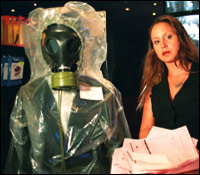
Even before September 11, at least one Upper East Side woman had given her garage attendant instructions that in the event of a biological or chemical attack, he should immediately bring her car up from the basement. Of course, she now realizes that were she faced with an actual emergency, he would be long gone, leaving her and fellow customers to fight over the elevator. “The irony,” she says, thinking of her $600 monthly garage fee, “is that the only people who are going to get out are people who park on the street.” New Yorkers have always been somewhat obsessed with finding the fastest route out of the city. But now – amid talk of crop dusters and germ-laden eighteen-wheelers – that exercise has turned deadly serious for some who believe that their very survival may turn on beating the traffic. One woman who does a lot of driving said she’s considering provisioning her car with food and water, the same way one might a sailboat. “And if this continues in cold weather – blankets,” she added. She also carries her sneakers everywhere, need she break into a run.
The woman with the garage is considering bicycles for the whole family. In fact, bicycle sales at stores such as Scandinavian Ski Shop soared after the terrorist attacks. Not that Lars Leirvaag, the shop’s bike mechanic, is offering any guarantees beyond the bike’s standard warranty. “It doesn’t matter what kind of vehicle you’re on,” explains Leirvaag, who served in the Norwegian Army as a nuclear-, biological-, and chemical-weapons specialist before moving to America. “You’re not going to get away from it.”
But Leirvaag has held onto his old military-issue gas mask, just in case. A good thing, since they’re hard to come by in the city at the moment. “We sold all 3,000 of them,” says Mark Jones, the manager of Iceberg Army and Navy in lower Manhattan. He currently has over 100 names on a waiting list.
MREs – military ready-to-eat meals – are also selling like hotcakes, even though hotcakes aren’t among the selections. “Ravioli,” Jones says, reviewing the rather limited menu. “Beans. Or macaroni and beef.”
Jones also carries parachutes, though they’re used parachutes. “We always let people know,” he says. So far he hasn’t sold any. “Who’s going to be flying?”
Perhaps Chicagoans. An executive assistant who works on one of the upper floors of the Sears Tower said that some of her fellow tenants tried to purchase parachutes just to be on the safe side. “The parachute company told them they don’t sell chutes to anybody who isn’t a licensed jumper,” she reports.
Back at home, an Upper West Side mom recently discovered the beauty of the Hudson River, not for recreational purposes, but as a possible escape route if everybody tries to leave the city at once. “My brother has a dock on his property in Edgewater, New Jersey,” she says. “He wants to get a boat. My husband looks like he’s giving serious thought to going in with him on the boat. It’s that serious.”
The flight instinct was triggered, at least in part, by a rumor they heard of an anthrax outbreak. It prompted the woman’s sister to purchase ten Cipro tablets, the antibiotic of the moment. “There wasn’t enough,” the West Sider recalls, though she was offered more at $4 a pill. She decided against it after calculating the cost of a supply sufficient to protect her immediate family. One’s budget, it turns out, may be the best antidote to hysteria. “We’re talking about $15,000 worth of Cipro,” she says.